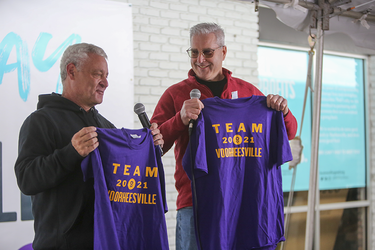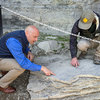Mitzen hopes Voorheesville businesses will revitalize flagging downtown
VOORHEESVILLE — While he was growing up in Voorheesville, entrepreneur Ed Mitzen used to buy baseball cards at the Stewart’s gas station and convenience store on Main Street, less than a mile from his family’s home on Stonington Hill Road.
His father was a biochemist who had worked for Sterling Drug and at the Veteran Affairs medical center, and his mother was a nurse at Albany Med.
“My mom tells the story that they moved to Voorheesville because it was the only place they could afford a house at the time,” said Mitzen, who was born in New Jersey before moving to New York. “We were living in Bethlehem, and it just got too expensive.”
They bought their Voorheesville home in 1975, for $30,000, when Mitzen was in the second grade.
“At that point,” he said, “Salem Hills was relatively new. It was a nice community, good school, safe, and affordable.”
Since then, Mitzen has gone on to great success, founding a marketing firm called Fingerpaint Group in Saratoga Springs, and then, with his wife, Lisa, Business for Good, a not-for-profit that performs what Mitzen calls “venture philanthropy” — using his entrepreneurial abilities to fund charitable endeavors.
The Mitzens announced this week that they are stepping up as co-CEOs when their current chief executive officer, Jahkeen Hoke, leaves at the end of the month to focus on his other interests.
Mitzen has also recently published a book called “Wealthy and White,” which is about the need for people like him, who have benefitted from a social structure that makes success easier than for people from marginalized communities, to “show up, step up, and give other people a hand up,” as the subtitle puts it.
Meanwhile, as Mitzen found prosperity elsewhere, the Stewart’s Shop where he used to buy cards became abandoned.
“I don’t think the changes downtown have been very significant,” Mitzen said of the time since he lived in Voorheesville, “with the exception of a few businesses moving out or closing, which is not unlike a lot of small towns in America.”
So, Mitzen has torn down the since-abandoned Stewart’s along with the Victorian-era apartment house behind it and the Victorian building across the street, which had housed a dental office. In their place, he is opening a café and tavern along with two apartments above them.
The hope, he told The Enterprise this week, is to help revitalize the area where he spent his childhood.
“When the recent graduating class are home from college for Thanksgiving, there isn’t really any place for them to go, right? They’re going out to Western Avenue [in Guilderland],” Mitzen said.
The idea for Blackbird Tavern, he said, came from surveying a “good percentage of the town” and learning that many residents are driving out of town to get dinner and drinks.
“So we came up with the idea to open up a sports tavern that would [have] really upscale pub food, a nice dinner on the weekends, and a really nice bar,” he said.
It will also have golf simulators so that people can “have some fun in the winter,” he said. “We’ve really spared no expense.”
Mitzen explained that, meanwhile, the Blackbird Café, across the street from the tavern, will try to appeal to the bicyclist community, since it’s near the Albany County Helderberg-Hudson Rail Trail, which attracts bikers from in and out of town.
Like any café, it will serve pastries, coffee, and some hot foods, but will also provide things like protein shakes and some bike equipment, in case anyone needs to do “minor repairs” while they’re out on the trail.
“I don’t think the town is big enough to support a fully stocked bike shop, but, you know, we’ll see how it goes,” Mitzen said. “We’ll see how the traffic is and what people really want, and we’ll try to provide it for them.”
Both businesses are expected to open this fall, he said.
Because they would be under the Business for Good umbrella, all profits they make will be donated, in this case to sports-related programs in the Capital District.
Also, the staff at each will be paid living wages and get strong medical benefits, as The Enterprise has previously reported.
Mitzen says that food banks and other types of organizations that help those with financial needs are doing “God’s work, but it’s putting a Band-Aid on a gunshot wound.”
“We’re not going to solve hunger with more food pantries,” he said. “We need to get people up the income curve to the point where they don’t need food stamps … and I think business plays a very big role in that.”
Mitzen said he didn’t know yet how many people he will employ at the Voorheesville businesses — although he guessed that it would be at least a “few dozen” — but that he expects it to be a diverse population that includes people with roots in the village.
“We’ve gotten connections to a lot of nonprofits in the area that are helping to train people for culinary jobs that may have not gone to college, or that may have had a bit of a rougher upbringing than what you might experience in Voorheesville,” he said. “I’m sure we’ll also hire some people from the community. We’ve already gotten requests for internships from people who are in college now and had graduated from Voorheesville.”
Mitzen himself is a graduate of Voorheesville’s Clayton A. Bouton High School.
Part of implementing a development project that is a benefit to the community, Mitzen acknowledged, was making sure that the area’s essential character isn’t changed by the new buildings, which are replacing two Victorian ones.
“We have tried to build these restaurants in the character of the [village] and character of the surrounding area,” he said. “If you drive by and look at the bike café, it doesn’t look like a futuristic building … It’s not like we put in an all-brick building next to Victorian homes, or put in an all-glass one that looks like a modern museum. We tried very hard to keep within the charm of the village.”
Also, he knows that he’s not the only one bringing new energy to the village, pointing to things like the new brewery and the rebirth of the pizza tavern.
“Everybody’s going to lift everybody else up,” he said.



